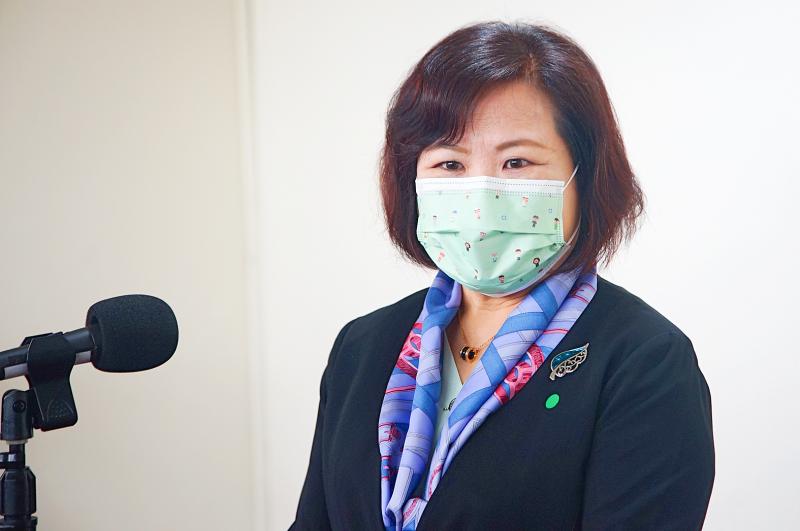Lifting an entry ban on overseas workers is being discussed, with people who are fully vaccinated against COVID-19 to be the first allowed in, Minister of Labor Hsu Ming-chun (許銘春) said yesterday, while the Ministry of Health and Welfare updated the vaccination rate in Taiwan.
“Agencies have been discussing supporting measures once the ban is lifted, and fully vaccinated migrant workers will be given priority,” Hsu said ahead of a meeting of the Social Welfare and Environmental Hygiene Committee at the Legislative Yuan in Taipei.
Arriving migrant workers would be required to present a certificate of vaccination and a negative polymerase chain reaction test result conducted within three days prior to departure for Taiwan, she said.

Photo: CNA
Once in Taiwan, they would undergo a mandatory 14-day quarantine, followed by a week of self-health management, she said, without offering any indication of when entry restrictions would be eased, except to say that it would hopefully be this year.
Ministry of Economic Affairs and health ministry officials also attended the meeting, at which they discussed labor subsidies during the pandemic after a shortage of workers that has worsened in Taiwan since a local outbreak of COVID-19 began in May.
Taiwan established an entry ban for Indonesian migrant workers in December last year as there was a serious COVID-19 outbreak there at the time.
The government has since May 19 barred all new migrant workers from entering Taiwan following a spike in local cases.
The number of migrant workers in Taiwan first exceeded 700,000 in September 2018 and in February last year exceeded 719,000, statistics from the Ministry of Labor showed.
The number fell to 699,154 in August, the data showed.
Meanwhile, Minister of Health and Welfare Chen Shih-chung (陳時中), who heads the Central Epidemic Command Center (CECC), said that the government has about 1.3 million AstraZeneca COVID-19 vaccine doses on hand, meaning it has nearly 3 million doses of all brands, which is about how many people are waiting to receive a second dose.
About 4.1 million to 4.4 million doses are to be administered in the 12th round of the national vaccination program, which is a challenging task for local governments and healthcare providers, so the CECC is grateful for their hard work, Chen said.
“Our goal is to achieve a first-dose vaccination rate of 70 percent and full vaccination coverage of 30 percent by the end of the month,” he said.
As the first-dose vaccination rate was 58.88 percent and the full vaccination rate was about 20 percent as of yesterday, 4.7 million doses, or an average of 350,000 per day, must be administered to achieve the target, Chen added.
Additional reporting by Lee I-chia

TRAGEDY STRIKES TAIPEI: The suspect died after falling off a building after he threw smoke grenades into Taipei Main Station and went on a killing spree in Zhongshan A 27-year-old suspect allegedly threw smoke grenades in Taipei Main Station and then proceeded to Zhongshan MRT Station in a random killing spree that resulted in the death of the suspect and two other civilians, and seven injured, including one in critical condition, as of press time last night. The suspect, identified as a man surnamed Chang Wen (張文), allegedly began the attack at Taipei Main Station, the Taipei Fire Department said, adding that it received a report at 5:24pm that smoke grenades had been thrown in the station. One man in his 50s was rushed to hospital after a cardiac arrest

SAFETY FIRST: Double the number of police were deployed at the Taipei Marathon, while other cities released plans to bolster public event safety Authorities across Taiwan have stepped up security measures ahead of Christmas and New Year events, following a knife and smoke bomb attack in Taipei on Friday that left four people dead and 11 injured. In a bid to prevent potential copycat incidents, police deployments have been expanded for large gatherings, transport hubs, and other crowded public spaces, according to official statements from police and city authorities. Taipei Mayor Chiang Wan-an (蔣萬安) said the city has “comprehensively raised security readiness” in crowded areas, increased police deployments with armed officers, and intensified patrols during weekends and nighttime hours. For large-scale events, security checkpoints and explosives

A car bomb killed a senior Russian general in southern Moscow yesterday morning, the latest high-profile army figure to be blown up in a blast that came just hours after Russian and Ukrainian delegates held separate talks in Miami on a plan to end the war. Kyiv has not commented on the incident, but Russian investigators said they were probing whether the blast was “linked” to “Ukrainian special forces.” The attack was similar to other assassinations of generals and pro-war figures that have either been claimed, or are widely believed to have been orchestrated, by Ukraine. Russian Lieutenant General Fanil Sarvarov, 56, head

PUBLIC SAFETY: The premier said that security would be tightened in transport hubs, while President Lai commended the public for their bravery The government is to deploy more police, including rapid response units, in crowded public areas to ensure a swift response to any threats, President William Lai (賴清德) said yesterday after a knife attack killed three people and injured 11 in Taipei the previous day. Lai made the remarks following a briefing by the National Police Agency on the progress of the investigation, saying that the attack underscored the importance of cooperation in public security between the central and local governments. The attack unfolded in the early evening on Friday around Taipei Main Station’s M7 exit and later near the Taipei MRT’s Zhongshan